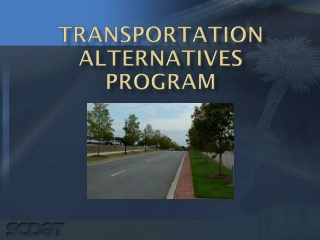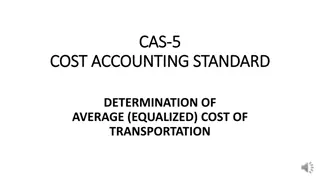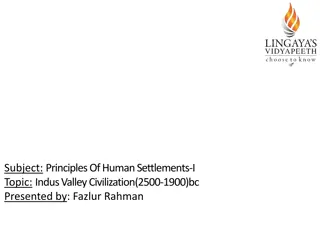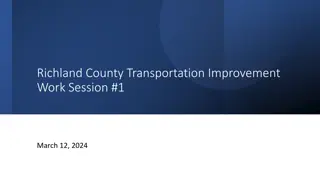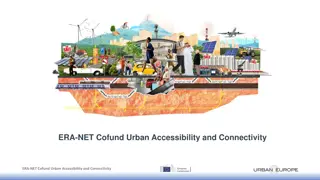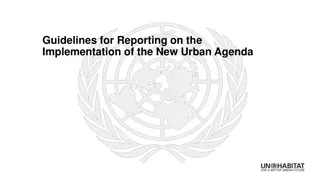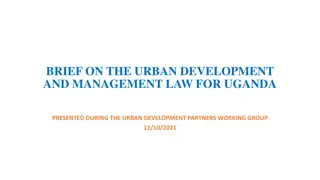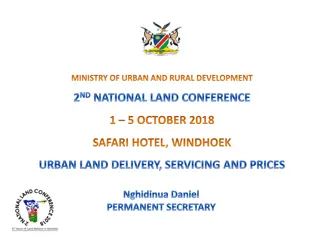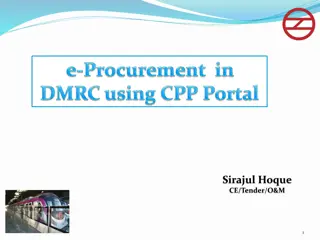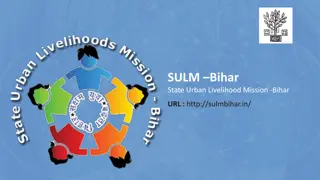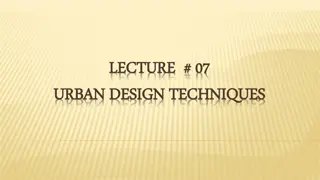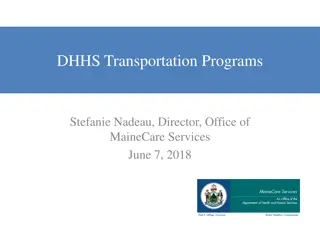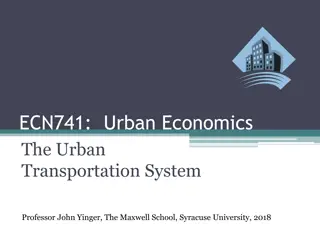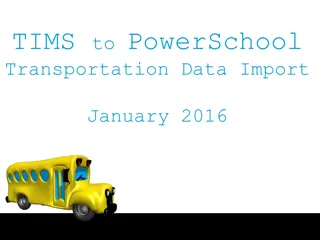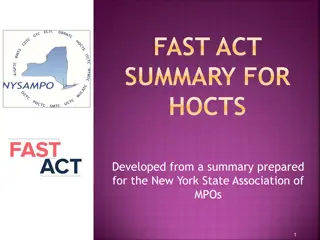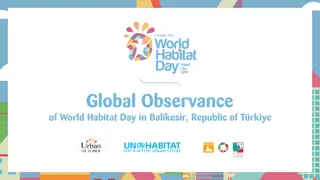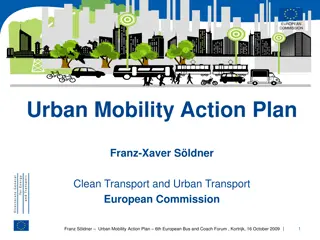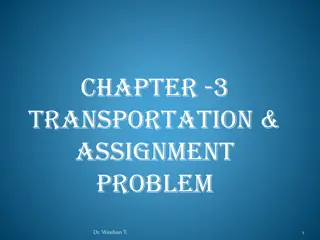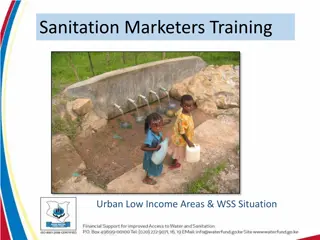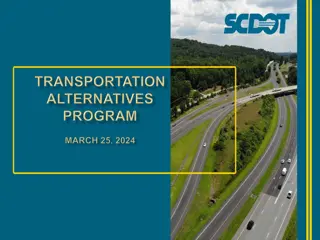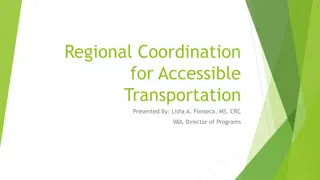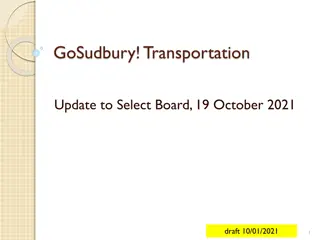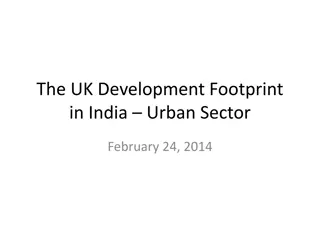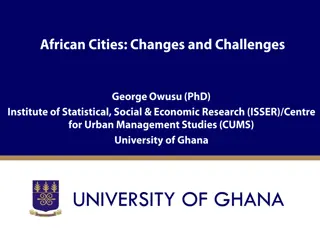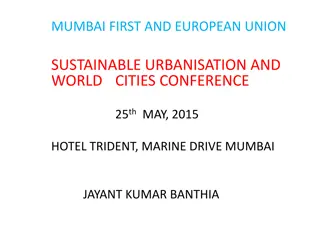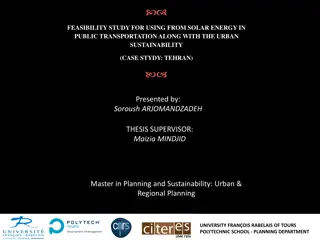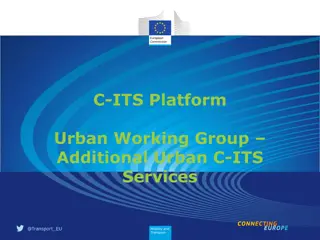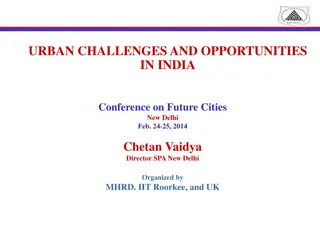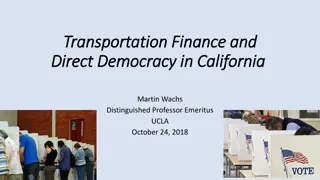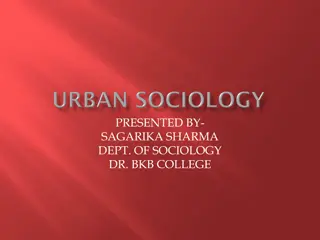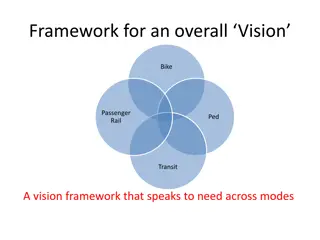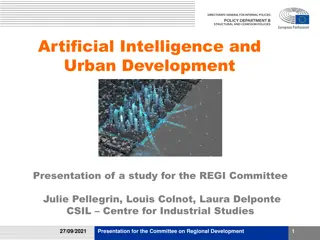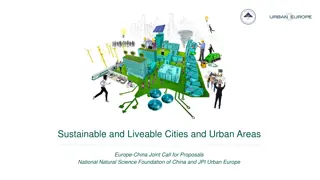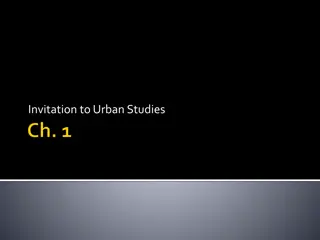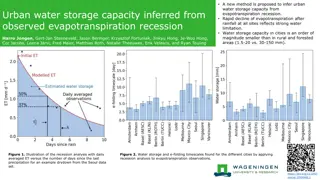Funding Opportunities for Non-Motorized Transportation in South Carolina
The US Department of Transportation's Federal Highway Administration provides funding to South Carolina through the Transportation Alternatives Program (TAP) to support non-motorized transportation initiatives. Local governments, schools, and other entities can partner with the South Carolina Depart
1 views • 21 slides
Cost Accounting Standards for Determining Transportation Costs
Understanding the importance of transportation costs in procurement and distribution, this guide outlines the standards for determining average costs, separation of transportation costs in accounting records, objectives for maintaining cost uniformity, components of transportation costs, and treatme
0 views • 11 slides
Understanding Transportation Programs and Trends
Transportation training session led by Megan Johnson, featuring topics such as Transportation Crash Course, Training Opportunities, and Transportation Trends & Updates. Includes discussions on different types of transportation services and their importance for communities.
2 views • 38 slides
Urban Development Models: Burgess and Hoyt
The Burgess concentric ring model and Hoyt sector model are key frameworks explaining urban social structures. Burgess's model illustrates urban land use in rings around the CBD, while Hoyt's model emphasizes outward growth along transportation arteries. Criticisms include applicability limitations
5 views • 13 slides
Dallas Comprehensive Urban Agriculture Plan Summary
Dallas's Comprehensive Urban Agriculture Plan focuses on promoting urban agriculture to ensure all communities have access to healthy, local food. The plan includes strategies to reduce regulatory barriers, support land access, provide education and resources, facilitate partnerships, and build mark
6 views • 7 slides
Richland County Transportation Improvement Summary
Richland County's transportation improvement work includes sessions on project principles, funding options, project costs, and guidelines for utilizing the transportation penny. The focus is on addressing transportation needs, project prioritization, funding challenges, and division of funds for var
0 views • 19 slides
Transportation Planning and Data Collection Insights
Understanding transportation planning involves various stages such as data collection, study area definition, and selection of external cordon lines. Collecting data on existing travel patterns, transport facilities, and land use is crucial for formulating effective transportation plans. Defining th
0 views • 27 slides
ERA-NET Cofund Urban Accessibility and Connectivity
ERA-NET Cofund Urban Accessibility and Connectivity focuses on enhancing urban accessibility and connectivity through collaboration among national funding agencies. The initiative aims to improve urban infrastructure and transportation systems to create more accessible and connected cities. Contact
0 views • 4 slides
Guidelines for Reporting on the Implementation of the New Urban Agenda
The guidelines emphasize the importance of periodic follow-up and review of the New Urban Agenda by Member States to ensure effective implementation. They stress inclusivity, transparency, and voluntary participation in tracking progress towards sustainable urban development goals. The document outl
2 views • 11 slides
Overview of Uganda's Urban Development and Management Law
Vision 2040 and National Development Plan emphasize the pivotal role of cities in Uganda's development. The absence of a legal framework for urban development led to fragmented mandates across ministries. Efforts are underway to establish a comprehensive legal framework for sustainable urban develop
0 views • 5 slides
Challenges and Solutions in Urban Land Delivery and Pricing in Namibia
The Urban Land and Housing Sector in Namibia faces significant challenges such as a backlog in land delivery, high input costs, weak urban planning, and limited institutional capacity. These issues lead to slow supply rates and affordability problems for end users. Addressing these challenges requir
0 views • 20 slides
Delhi Metro Rail Corporation: Transforming Urban Transportation
The Delhi Metro Rail Corporation (DMRC) has revolutionized urban transportation in Delhi and NCR by introducing a modern metro system with eco-friendly services. With over 300 train sets and a vast operational network, DMRC has set a benchmark for metro projects in India. The successful implementati
0 views • 11 slides
Overview of SULM Bihar State Urban Livelihood Mission
The SULM Bihar State Urban Livelihood Mission, an initiative under the National Urban Livelihoods Mission (NULM), aims to empower urban poor households through self-employment and skilled wage opportunities. The mission focuses on poverty reduction and enhancing livelihoods sustainably by establishi
0 views • 13 slides
Urban Design Techniques for City Improvement
Urban design techniques play a crucial role in urban improvement by providing concepts and tools for city building. Some of these techniques include the Open Space Technique, Transportation System Technique, Capital Network Technique, Public Policies Technique, Physical Design Technique, Plug-in Tec
1 views • 11 slides
Maine DHHS Transportation Programs Overview
The Maine Department of Health and Human Services (DHHS) oversees various transportation programs aimed at providing non-emergency transportation services to low-income, child welfare-eligible, and Section 17-eligible individuals. These programs are managed through regional brokerage systems, with b
3 views • 5 slides
Understanding Urban Transportation Systems Through Modeling
Explore the dynamics of urban transportation systems through various models, from simple grids to more complex structures. Learn how transportation costs are calculated, and how different grid layouts impact travel efficiency. Dive into the theory behind traffic congestion and the implications for u
7 views • 59 slides
Importing TIMS Transportation Data into PowerSchool
Explore the process of extracting, formatting, purging, and importing TIMS transportation data into PowerSchool for efficient management of student transportation information. This includes creating TIMS extracts, updating bus stop information, and optimizing transportation planning through geocodin
2 views • 43 slides
Overview of FAST Act for Transportation Planning
The FAST Act, passed in 2015, authorizes federal programs for transportation development with a focus on surface transportation. It extends funding through 2020, totaling $304.7 billion. The Act aims to enhance resiliency, reliability, and stormwater mitigation in transportation systems. Planning fa
2 views • 10 slides
Roundtable on Urban Regeneration: Social Value Creation with Diverse Speakers
The Roundtable on Urban Regeneration focuses on challenges posed by Covid-19, Climate, and Conflicts on inequalities. It explores how urban regeneration can address these challenges and create social value while reducing poverty and inequality. The event also delves into the role of the private sect
0 views • 15 slides
European Commission Urban Mobility Action Plan Overview
The European Commission's Urban Mobility Action Plan focuses on promoting sustainable urban transport to address the challenges faced by urban areas in Europe. The plan emphasizes the importance of efficient transport for economic growth, citizen concerns related to urban mobility, and the role of t
0 views • 12 slides
Impacts of Marketisation on Home Care for Older People in Urban China
This study by Wenjing Zhang from the University of Bristol delves into the effects of the marketisation process on home care for the elderly in urban China. It explores the rationale behind the marketisation of care, the trends in home care marketisation, and the processes involved. The background s
0 views • 19 slides
Understanding Transportation and Assignment Problem
Transportation and assignment problems involve optimizing the shipment of goods from various sources to multiple destinations while minimizing total transportation costs. These problems deal with limited supply, known demand, constant shipping costs, and integer quantities. The transportation algori
0 views • 64 slides
Target Areas for Sanitation Marketers Training in Urban Low-Income Areas
Target areas for sanitation marketers training in urban low-income areas include informal settlements, planned urban areas with low-income housing, informal housing in planned residential areas, urban IDP settlements, and urban sub-centers. These areas present challenges with water supply and sanita
0 views • 18 slides
Insights on Urban Transportation Policy in Chicago
Discussion by Panle Barwick sheds light on the broken transportation market in urban cities like Chicago, with data revealing the significant impact of congestion on drivers and the economy. The paper offers an innovative theoretical model, rich empirical analysis, and highlights the importance of c
0 views • 15 slides
Enhancing Transportation Infrastructure Through Federal Funding Programs
The Transportation Alternatives Program (TAP) funded by the USDOT's Federal Highway Administration supports transportation projects in South Carolina based on population categories. TAP funds are allocated to Transportation Management Areas (TMAs), Small Urban Areas, and Non-Urban Areas, prioritizin
0 views • 21 slides
Understanding Regional Coordination for Accessible Transportation
This presentation delves into the concept of regional coordination in accessible transportation, focusing on the Regional Transportation Advisory Panel, 5-year regional transportation goals, and the significance of the Safe, Accountable, Flexible, Efficient Transportation Equity Act. It emphasizes t
0 views • 16 slides
Enhancing Livability in Sudbury Through Transportation Initiatives
The GoSudbury! Transportation Update to the Select Board on October 19, 2021 highlights the importance of addressing transportation as a key component of livable communities. The initiative aims to create a safe, secure, and inclusive environment by improving transportation options for residents of
0 views • 26 slides
UK Development Footprint in India Urban Sector - Towards Smart Urbanisation
The UK has been engaged in the urban sector in India for over 30 years, focusing on slum infrastructure development initially and transitioning towards sustainable development and smart urban growth. The emerging priority is smart urbanisation, aiming to build inclusive and climate-resilient cities
0 views • 10 slides
Understanding African Urbanization: Challenges and Trends
Unpacking the narratives of African urbanization and cities, this collection explores Africa's unique urban revolution, urban challenges, and the prevalence of informality in its cities. Data and projections highlight the evolving urban landscape across different regions in Africa, emphasizing the s
0 views • 14 slides
Urbanization in India: Trends and Challenges
The urban population in India has seen significant growth over the years, reaching 31.30% in 2011. However, urbanization in India faces challenges such as lopsided growth, lack of industrialization, and issues with rural-urban migration. Despite this, India has a dispersed urban population, with var
0 views • 21 slides
Feasibility Study on Solar Energy in Tehran's Public Transportation for Urban Sustainability
Irregular energy consumption and urban challenges in transportation have led to a feasibility study on using solar energy in public transportation in Tehran. The study aims to determine the potential of solar energy for urban sustainability and address the importance of sustainable public transporta
0 views • 21 slides
Urban C-ITS Services for Enhanced Mobility and Transport Management
Urban C-ITS (Cooperative Intelligent Transport Systems) Working Group discusses additional services for improving mobility and transport in urban areas. Outcomes of meeting 1 include various C-ITS services like traffic signal priority, green light optimization, traffic information, and more. The cat
0 views • 24 slides
Urban Challenges and Opportunities in India: Strategies for Future Cities
This content discusses the urban challenges and opportunities in India, focusing on population trends, urban initiatives, and the Jawaharlal Nehru National Urban Renewal Mission (JNNURM). It emphasizes the need for sustainable, inclusive, and smart cities with strategies such as improving urban gove
0 views • 8 slides
Transportation Finance and Direct Democracy in California
Proposition 6 on November 6th has garnered attention, but voters in multiple states will decide on over 250 transportation ballot measures totaling over $55 billion. California, with a longer history and greater funding needs, has been at the forefront of transportation investments, including the us
0 views • 29 slides
Understanding Urban Sociology: A Comprehensive Overview
Urban sociology explores the dynamics of city life, urbanization, and urban communities. It delves into the origin and development of cities, social structures, family dynamics, class struggles, urban issues, and more. Key elements include population density, family structures, occupations, social h
0 views • 6 slides
Comprehensive Vision for Integrated Transportation System
A vision framework addressing the needs of bike, pedestrian, rail, and public transit across urban and rural areas, with an emphasis on safety, public health, connectivity, sustainability, and congestion relief. The framework aims to secure sufficient funding, promote active transportation, reduce r
0 views • 15 slides
Role of Artificial Intelligence in Urban Development: Study Presentation for the REGI Committee
Explore the implications of AI in urban development, addressing key definitions, expected benefits, potential risks, enabling conditions, and EU policy. Emphasize the importance of governance in implementing AI in urban contexts, highlighting benefits like improved urban management, economic opportu
0 views • 14 slides
Europe-China Joint Call for Sustainable Urban Development
This joint initiative between JPI Urban Europe and NSFC aims to promote research projects focusing on sustainable and liveable cities in both Europe and China. With a budget of 9.35 million euros on the European side, the call seeks to address key urban challenges such as economic transformation and
0 views • 21 slides
Insights into Urban Studies: Sociological Variables and Cultural Influences
Delve into the world of urban studies, exploring how urban sociology investigates systematic causes and effects on people in urban environments. Discover the challenges of defining 'urban,' understanding informal city structures, and navigating public spaces. Uncover the cultural influences of citie
0 views • 12 slides
Inference of Urban Water Storage Capacity from Evapotranspiration Recession Analysis
A new method is proposed to estimate urban water storage capacity based on evapotranspiration recession analysis, showcasing the significant differences between urban and rural/forested areas. The study highlights the strong water limitations in cities, leading to smaller water storage capacities. F
0 views • 4 slides
